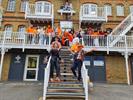Paul Holmes 01 Apr 2018 // 1:53PM GMT

Michigan State University’s response to the crisis caused by sexual assault allegations against its longtime doctor Larry Nasser has been insensitive and inadequate. The university allowed Nasser to continue seeing patients for 18 months after he was first accused—until more than 140 women had come forward with charges of their own—and has repeatedly closed ranks around those who mishandled the situation.
Throughout it all, a constant refrain has been that the school’s president and trustees have not listened to the concerns of Nasser’s victims, and of MSU students and faculty more broadly.
So when MSU retained Weber Shandwick to provide crisis communications counsel in December of last year, it seemed like a long overdue acknowledgement that the university had needed to do a better job of living up to expectations. But the engagement lasted only a couple of months, and it has led unexpectedly to a mini-crisis of its own.
On Wednesday of last week, the Lansing State Journal \newspaper published an article, based on information obtained via a public records request, under the headline “MSU spent $500K in January to monitor social media accounts of Nassar victims, others.”
As that headline suggests, the article focused on two aspects of the agency’s work for Michigan State University: first, the cost of retaining public relations counsel to advise on the crisis, and second, the fact that Weber Shandwick’s work included social media monitoring—including monitoring the feeds of several of the victims, their relatives and supporters.
To its credit, the Journal’s reporting was pretty straightforward, despite that headline. It presented several emails from Weber Shandwick executive to the University. And it provided context, explaining that MSU had spent $9 million on legal advice related to the scandal—many times more than it spent on PR advice.
Not all of the follow-up coverage was quite so neutral. NPR, for example, published its own piece under the headline “Michigan State Spent $500,000 To Keep Tabs On Nassar Victims, Journalists,” an interpretation of the original story that was ungenerous at best, dishonest at worst (it’s not clear how much of the $500,000 related to media monitoring, and “keep tabs” seems like a loaded term).
A CBS report, meanwhile, quoted the editor of the State Journal claiming that “survivors of sexual abuse… are upset with the university after news of social media monitoring.” The same article also reported that “many of the survivors feel the university did not listen to them.”
And Deadline Detroit, focusing on the money spent by MSU to protect its reputation, labeled the firm’s fees “obscene” and quoted several local Michigan public relations people who found Weber Shandwick’s fees “despicable” and suggested the agency had been “caught fleecing a public institution in crisis.”
Weber Shandwick, clearly stung by the criticism, issued a rare public statement: “The majority of our work involved crisis counsel to address the tragedy. We were not hired to monitor victims’ social media accounts. As with any assignment, we forwarded to our clients traditional media and publicly available social media pertaining to the horrible tragedy at MSU, including statements made online by the victims.
“The victims were and continue to be the most important voices in the conversation.”
I’m not going to spend much time on Weber Shandwick’s billing practices. I am on record believing that public relations firms continue to undervalue their time and expertise, and nothing about Weber Shandwick’s $359 an hour average rate leads me to question that judgment. I am almost certain that the legal advisors involved in this case are charging higher hourly rates, and I am equally convinced that the cost to MSU in terms of reputation has the potential to be higher than the cost of any legal settlement.
(I will say that the eagerness of some PR people to impugn the integrity of fellow professionals based on limited information, and to trivialize the need for and value of high-level advice in times of crisis, leaves an unpleasant taste.)
I do think the question of media monitoring—and social media monitoring—is worthy of close examination.
But first of all, it’s important to understand the role of public relations counsel in a crisis such as this.
For sure, there are some clients who hire a PR firm to “spin” a story, to shift blame, to downplay the damage, to discredit opponents. That kind of PR is ultimately self-defeating and can end up doing more harm to an organization’s reputation than the inciting incident. Nevertheless, there are firms a client can turn to for that kind of approach; Weber Shandwick is emphatically not one of them.
The smarter and more strategic role for a PR firm is to provide advice on how to make things right. That means providing advice not only on the most effective communications messaging—although the right tone and the right words are important—but on the concrete actions that an organization needs to take in order to regain lost trust. This is the kind of work Weber Shandwick typically undertakes.
Second of all, it should not come as a surprise that media monitoring has always been part of a public relations agency’s job. I’d go so far as to say that it’s impossible for PR agencies—or PR departments—to do their job if they are not monitoring the media.
A decade ago, this meant culling articles from newspapers and magazines, and capturing coverage on television and radio. Today, it extends to social media, because it has become apparent that a Facebook post or a tweet can trigger a crisis—or create an opportunity for brand engagement—just as easily as a mainstream media piece.
In general, there is absolutely nothing wrong with this. Companies and other institutions have a legitimate interest in knowing and understanding what is being said about them. And I would argue that for the most part, the people doing the talking share that interest. Customer complaints can be addressed this way. In a crisis, many social media posts are likely to be addressed—directly or indirectly—to the institution under fire.
That line above about the victims being “the most important voices in the conversation” is not mere lip service: it is the starting point for any halfway intelligent approach to managing a crisis like this. A PR firm can’t help an organization rebuild its trust and credibility unless it understands what those who were betrayed want and expect. And often, explaining that to the client in the victims’ own words is the most compelling and convincing way to argue for the right thing.
However, there are three caveats when it comes to the propriety of monitoring, two general and one specific to this case (or to this kind of case).
The first speaks to the kind of information being gathered. I’d suggest that there is a difference between gathering information relevant to an organization’s reputation, and gathering other, more personal information.
So monitoring a social media platform for discussion of your brand, your company, or in this case your university raises relatively few ethical problems so long as the information is in the public domain. (I suspect very few people would be complaining if an agency representing the victims had been discovered monitoring the personal Facebook feeds of the university’s president or trustees.)
On the other hand, digging through a social media account for more personal information (perhaps to learn whether someone was rejected on a university application, for example) clearly crosses the line into sleaze.
Which leads to the second caveat, which concerns how the information is used. If you’re using the information you gather monitoring a social media platform to inform your response—to help you form a policy that helps you respond to criticism and meet the legitimate demands of your critics—then there’s no problem.
I’d go further, and say it is usually fine to gather information that helps to combat criticism, to identify inaccuracies and inconsistencies in your critics’ arguments.
Again, though, a line is clearly crossed when the organization uses the information it has gathered to launch personal, ad hominem attacks (accusing a teenager of whining and mocking his rejection, for example) that have literally nothing to do with the issue at hand.
And let’s be absolutely clear. Nothing in the Lansing State Journal report—or any of the followup—suggests that either Weber Shandwick or its client in the Michigan State office of communication and brand strategy crossed either of those lines.
I would suggest, then, that the real complaint here is not that MSU’s “social listening” efforts were inappropriate, but rather that the university did not act appropriately on what it heard.
During the period that Weber Shandwick was on retainer, calls for president Simon and the board of trustees to resign were growing increasingly loud. Simon eventually announced her resignation on January 24. A week later, the trustees appointed John Engler—a former Republican governor with his own history of turning a blind eye to sexual assault allegations—as interim president. That led MSU’s faculty to overwhelmingly support a vote of no confidence in the board of trustees.
It was after all that that Weber Shandwick stepped away. There’s no way of knowing for sure what motivated that departure, but most crisis PR people have encountered situations in which clients had their own reasons for failing to act on even the best counsel.
Given all that, there’s no reason to believe that Weber Shandwick acted at all inappropriately in its work for MSU. But that doesn’t mean we shouldn’t pay attention to some of the criticism in this case—which leads us to the case-specific caveat, which is that public relations people would do well to consider the implications of social listening in a case such as this one, involving the abuse of young people, in which the ongoing vulnerability of the victims needs to be a primary consideration.
The last year has seen some pretty big changes in norms and mores. The #metoo movement has made behaviour that was ignored for far too long unacceptable. Companies that previously thought of the NRA as just another affinity marketing partner have come to realize that its role in American society is much more toxic. The oversharing of personal data, which once barely monitored with consumers, is now prompting some to #deletefacebook.
Given the way in which public opinion can shift, there are pragmatic reasons for PR people to think long and hard about what’s appropriate in this context and whether changing public attitudes should cause us to reconsider activities we have taken for granted.
One of the consequences of the social media revolution is that the disintermediation of mainstream journalism has empowered ordinary individuals. But just because many social media users have as much power today as professional journalists did in yesteryear, that doesn’t mean that the rules of engagement should remain the same. Journalists, for the most part, understood that on occasion they were being treated by companies as antagonists, members of an “opposing team”; but that’s not an appropriate way to treat ordinary people—especially if they are victims of heinous acts.
That massive disparity in power between one of the nation’s largest universities and the victims in this case has the potential to make this kind of media monitoring seem a little creepy to the lay observer. Perhaps there is a case for doing this in a way that avoids even the appearance of impropriety, of “lurking.” Perhaps there is a way to do this on a permission-based basis or with greater transparency.
Perhaps it is time to make what has long been implicit—that listening to the voices of critics and victims is essential to a good public relations response—a little more explicit. Perhaps a statement at the outset, to the effect that “the agency has been hired to listen to the voices of the victims and to make sure they are heard” would help deflect any criticism.
But that’s a nuanced debate (more a question of good manners than industry ethics, perhaps) that may need to take place at another time. There’s little indication to believe that reporters promoting this story have much interest in nuance, but that doesn't mean we can't have an intelligent discussion among ourselves about how best to handle this issue going forward.


































.jpg)































